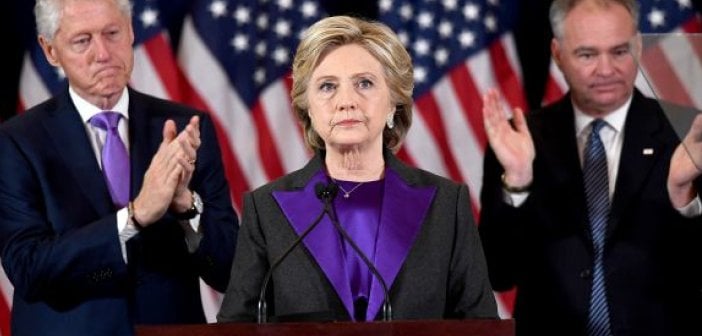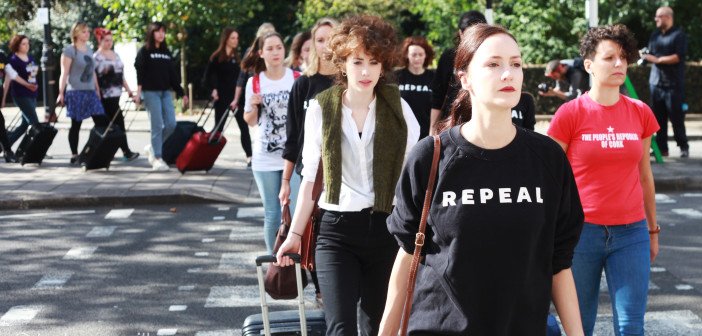International Activism and the American Expatriate
There was nothing particularly ominous about New Years Day 2016, which would imply that it was the beginning of an end of an era. With the exception of a particularly nasty slide of a patch of ice (a frequent reminder that soft shoes and London weather do not easily co-exist), it started much like any other year: cold, windy and with another doomed intention to rise early and do yoga.[pullquote] I found the morning after each vote to be devastating, and led to a vague sense that my life had changed permanently.[/pullquote]
Yet 2016 has been far from business as usual, for me and for the rest of the world. As an expat, I am often called on to offer an “expert” opinion, whether as an explainer of American politics to Irish friends or debating EU policies to baffled Americans. Twice this year, I woke up to find that my perspective had hopelessly shifted. Despite two strong media predictions (and those by the bookies) that the United Kingdom would vote to remain in the European Union and that Hillary Clinton would win the presidency of the United States, I found the morning after each vote to be devastating, and led to a vague sense that my life had changed permanently.
After spending almost as much times living outside the US as within it, I assumed I would have similar responses to both disappointments, but I was surprised at my incredibly differing reaction to those two devastating experiences. Living in a borough of London which voted in support of Brexit, I began to feel anxious when passing neighbours. Membership of the EU isn’t a distant concept to my family; my husband is European, I remain in the UK as the spouse of an EU citizen; we were the migrants discussed as taking up NHS appointments and parking spaces.

It was hard to not feel unwelcome, to not feel as if our neighbours had rejected us. I had worked as a receptionist within the NHS and the idea that myself and other foreign-born staff were a drain on resources felt so contrary to our experience of working long hours to assist patients. My husband, who has always worked in construction, was contributing to the country’s infrastructure. In addition to our jobs, we also volunteered – and were eager to be a positive presence not only financially, but in our local community. The vote had the effect of isolating me from the UK – the city which had originally welcomed us no longer felt like our home, or a place that we could continue to build a life in.[pullquote]The city which had originally welcomed us no longer felt like our home, or a place that we could continue to build a life in.[/pullquote]
My response to the election of Donald Trump felt different. There was certainly a sense of disconnection, as the vote certainly did not echo my experiences within the “Acela corridor” of the East Coast, but instead of isolation, I felt a sinking pang of responsibility. I didn’t feel wounded and blindsided by the American vote, I instead knew that I bore part of the responsibility for the fear and agitation that Muslim-Americans, LGBT Americans and undocumented migrants were experiencing after the election. Once the shock and disbelief wore off, I struggled with the reality that as an expat, I had always felt like I had more of an influence on Irish politics than in the large chaotic mess of American government.
As a phoner for the Abortion Support Network, I have been able to contribute the lived experiences and the voices of anonymous women who have been affected by the strict enforcement of the 8th Amendment. Yet an ocean had created a remove from American experiences and involvement in American politics. At a time when minorities are listening to abusive rhetoric and feeling unsafe, expatriate Americans can no longer indulge in the luxury of simply ranting against Trump appointees on Facebook or tweeting about the importance of respecting LGBT rights.

The day after the election, well-meaning non-Americans would try to offer reassurance. “It will all be ok,” I heard repeatedly from my Londoner friends. And while that comfort was genuinely intended, it just sounded so passive. Despite what we may wish, the arc of justice has never simply “sorted itself out”– it has to be actively moved forward through the work of activists. As a white, middle class, English speaking American expat, I have the indulgence of opting out for the next four years – deciding to ignore unpleasant news, refocus my daily reading on book reviews and baking blogs (and the cat videos.There are always cat videos).[pullquote]Expatriate Americans can no longer indulge in the luxury of simply ranting against Trump appointees on Facebook or tweeting about the importance of respecting LGBT rights.[/pullquote]
Yet distance provides advantages. The first is the broader perspective – to an American who has always been able to buy unrestricted weaponry and has never experienced a country without an active death penalty, these may seem like basic tenets of society. Being able to attest that Britain and Ireland are still functioning democracies without them is an important voice in an American conversation. The second benefit (unfairly) is the lack of consequences for taking an unpopular view. Advocating for unpopular positions such as voting rights for those who have served prison sentences or access to latter abortions is much easier when a potential employer has minimal interest in foreign internal politics.
The dilemma of how to influence your home state’s politics from a distance is becoming a broader conundrum than simply an American dilemma. Plenty of young Irish emigrants, isolated by restrictive voting laws, face a similar quandary as to how to remain connected with the politics of their homeland. One group which has organise to remain politically active is the London Repeal campaign, encouraging Irish emigrants to engage with the Citizens’ Assembly and make their views and voices heard, regardless of where they’re now residing. My activism as a member of the Democrats Abroad Women’s Caucus takes a similar tone; the positive experience my colleagues have had with paid parental leave has meant that I can see clearly the unfairness of American espousal of family values while my mother was only given six weeks of to care for a restless newborn.

Yet this international activism will eventually lead to an unfortunate recognition of the similarities in the international struggles of minorities for human rights. Donald Trump’s rhetoric on Hispanic migrants will sound very familiar to anyone who has heard his friend Nigel Farage discussing Eastern Europeans in London. As a pro-choice activist, the horrific experiences of women in Texas forced to travel for hours to access an abortion could be Irish women taking a ferry to England, with San Antonio and Austin changed to Liverpool and Manchester.
The maxim to think globally and act locally is a cliché for a reason: but there is some truth to it. I have to believe that creating a climate where women are allowed to take responsibility for their own bodily autonomy will have global effects. Maybe this is just helpful to assuage the guilt of not currently being in the US fighting tax cuts for the wealthy, but also to remind myself that there are some amazing Irish migrant women in the US doing that important and essential work – so in some ways, the energy and focus will balance out.
